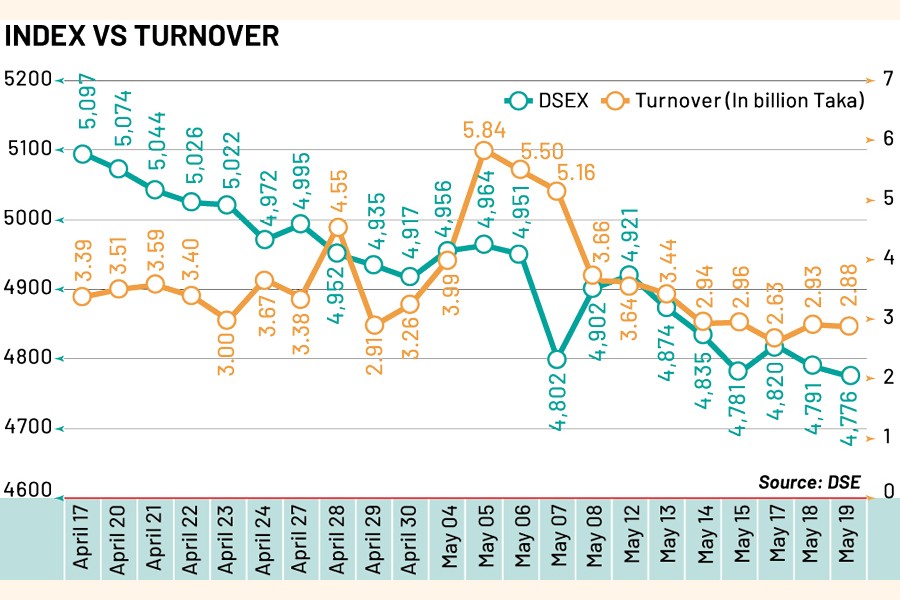Stocks plunge to 5-year low despite govt promises to support market

Published :
Updated :

Stocks witnessed another setback on Monday, with the prime index of the Dhaka Stock Exchange (DSE) sinking to a fresh five-year low despite government efforts to boost investors' confidence.
The interim government has planned a number of initiatives, including the offloading of government stakes in state-run and multinational companies, to increase the availability of quality shares in the market.
But the announcement of such measures failed to bring any positive result. The market volatility persisted and sellers maintained their dominance amid uncertainties over the market outlook.
The relentless bearish spell remains dominant in the market as investors found no immediate solution to the prevailing dismal market outlook, said Md Sajedul Islam, managing director of Shyamol Equity Management.
The long-pending negative equity has been hindering the market's growth for more than a decade while one after other issues hit the investors' sentiment negatively.
"Due to the continuous market decline, many margin accounts came under forced sale, which exacerbated the index plunge," said Mr Islam.
Moreover, institutional investors are mostly in a hands-off position due to a liquidity crunch while small investors are not confident enough to inject fresh funds into the market, he added.
Although favourable earnings disclosures from some companies enticed some investors into shifting their positions to those stocks, skeptical investors chose to stay on the sidelines, still reeling from the ongoing market downturn and mounting losses in their portfolios.
Jittery investors continued to dump their holdings to escape further losses in absence of any strong catalyst to revive investor confidence in the distressed market.
The benchmark index of the Dhaka bourse finally slid 15 points or 0.31 percent to 4,776, the lowest in nearly five years since August 2020, when the coronavirus pandemic played havoc on the economy.
Investors have shown pessimism about the market for a long time but the fear of further devaluation of the taka following the adoption of market-based exchange rate regime added to their worries, market analysts say.
Lower-than-expected earnings declarations and pressure on margin loan adjustment coupled with price fall of large-cap stocks continued to put a negative impact on the market.
Investors dumped shares of food, non-bank financial institutions, telecom and banking stocks, exerting pressure on the indices.
Mominul Islam, chairman of the DSE, at a meeting on Sunday cited high interest rates of government securities, declining corporate profitability, legacy of negative equity, fear of further devaluation of local currency and manipulation are hindering market growth.
Moreover, investors prefer to adopt a cautious stance ahead of the upcoming budget declaration for the next fiscal year.
Price fall of selective blue chip stocks, such as BAT Bangladesh, Al-Arafah Islami Bank, Midland Bank, Walton and Grameenphone, dragged the prime index down. They jointly accounted for a 10-point fall of the key index.
The blue-chip index, a group of 30 prominent companies, lost 8 points to 1,772 while the DSES Index, which represents Shariah-based companies, shed 4 points to 1,042.
Trading activities remained sluggish, with turnover down to Tk 2.88 billion from Tk 2.92 billion the day before.
Investors were mostly active in the banking sector, which accounted for 19 per cent of Monday's turnover, followed by the textile (13 per cent) and mutual fund (11 per cent) sectors.
Most major sectors showed negative performance. The food sector experienced the highest loss of 1.4 per cent, followed by non-bank financial institutions, telecom, banking, engineering and pharmaceuticals industry.
Of the 397 issues traded, 202 declined, 125 advanced, and 70 remained unchanged on the DSE trading floor.
Orion Infusion was the most-traded stock, with shares worth Tk 141 million changing hands, closely followed by Beach Hatchery, Midland Bank, and City Bank.
The port city bourse, Chittagong Stock Exchange, also ended lower, with the CSE All Share Price Index (CASPI) shedding 25 points to 13,378 while the Selective Categories Index (CSCX) losing 13 points to 8,178.
Meanwhile, a group of stock investors took to the streets once again on Sunday and announced a 48-hour ultimatum demanding the resignation of Khondoker Rashed Maqsood, chairman of the Bangladesh Securities and Exchange Commission (BSEC), for "failure" to bring back stability in the market.
babulfexpress@gmail.com


 For all latest news, follow The Financial Express Google News channel.
For all latest news, follow The Financial Express Google News channel.